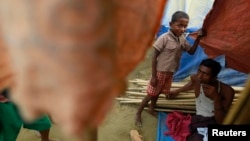RANGOON —
A U.N. envoy on Monday urged Burma, also known as Myanmar, to allow the return of aid groups forced to flee attacks in Rakhine state, warning their departure threatened "severe consequences" for Muslims sheltering in camps from violence by majority Buddhists.
Tomas Ojea Quintana, the U.N.'s Special Rapporteur on the human rights situation in Burma, said water shortages could reach critical levels within a week in some displacement camps,where 140,000 people live as a result of communal conflict since 2012.
Some 700,000 people outside the camps are also vulnerable, the U.N. said in a statement.
"These workers were in Rakhine State providing essential life-saving support, including health services, water and food to internally displaced persons, isolated villages, and other affected communities," Quintana said.
Recent developments in Rakhine State were the latest in a long history of discrimination against the Muslim Rohingya community, which he said "could amount to crimes against humanity".
Trouble broke out on March 27 after rumors spread that a female international aid worker had desecrated a Buddhist flag.
Some 400 rioters massed outside Malteser International's office and began throwing stones before attacking other buildings occupied by aid groups and the U.N. Aid groups have long drawn the ire of some Rakhine Buddhists who accuse them of favoring the Rohingya, a group that makes up the vast majority of victims of the sectarian violence.
Humanitarian groups reject accusations of bias towards Muslims and many workers say they have been threatened and intimidated.
The Rakhine state government said last week that international aid organizations would be allowed to resume their work "later this month", but did not specify a date.
Aid workers say resuming the humanitarian effort will be difficult because local people, including subcontractors who transported food, have been warned not to work with international agencies.
"Every day that goes by there is an increased chance of people dying because they don't have access to medical services," said Pierre Peron, spokesman for United Nations Office for the Coordination of Humanitarian Affairs.
"The clock is ticking," he said.
Britain on Monday summoned Burma's ambassador in London to call on the country to allow aid agencies to resume their work in Rakhine.
Tomas Ojea Quintana, the U.N.'s Special Rapporteur on the human rights situation in Burma, said water shortages could reach critical levels within a week in some displacement camps,where 140,000 people live as a result of communal conflict since 2012.
Some 700,000 people outside the camps are also vulnerable, the U.N. said in a statement.
"These workers were in Rakhine State providing essential life-saving support, including health services, water and food to internally displaced persons, isolated villages, and other affected communities," Quintana said.
Recent developments in Rakhine State were the latest in a long history of discrimination against the Muslim Rohingya community, which he said "could amount to crimes against humanity".
Trouble broke out on March 27 after rumors spread that a female international aid worker had desecrated a Buddhist flag.
Some 400 rioters massed outside Malteser International's office and began throwing stones before attacking other buildings occupied by aid groups and the U.N. Aid groups have long drawn the ire of some Rakhine Buddhists who accuse them of favoring the Rohingya, a group that makes up the vast majority of victims of the sectarian violence.
Humanitarian groups reject accusations of bias towards Muslims and many workers say they have been threatened and intimidated.
The Rakhine state government said last week that international aid organizations would be allowed to resume their work "later this month", but did not specify a date.
Aid workers say resuming the humanitarian effort will be difficult because local people, including subcontractors who transported food, have been warned not to work with international agencies.
"Every day that goes by there is an increased chance of people dying because they don't have access to medical services," said Pierre Peron, spokesman for United Nations Office for the Coordination of Humanitarian Affairs.
"The clock is ticking," he said.
Britain on Monday summoned Burma's ambassador in London to call on the country to allow aid agencies to resume their work in Rakhine.





